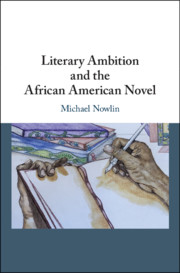Book contents
- Literary Ambition and the African American Novel
- Literary Ambition and the African American Novel
- Copyright page
- Dedication
- Contents
- Acknowledgments
- Abbreviations
- Introduction
- Chapter 1 “The First Negro Novelist”: Charles Chesnutt’s Point of View and the Emergence of African American Literature
- Chapter 2 James Weldon Johnson’s Dream of Literary Greatness and His Groundwork for an African American Literary Renaissance
- Chapter 3 The Strange Literary Career of Jean Toomer
- Chapter 4 Wallace Thurman’s Judgment and the Rush toward Modernism
- Chapter 5 Zora Neale Hurston and the Great Unwritten
- Chapter 6 Richard Wright’s Compromises: Radicalism and Celebrity as Paths to Literary Freedom
- Chapter 7 “Literary to a Fault”: The Singular Triumph of Ralph Ellison
- Conclusion
- Notes
- References
- Index
Chapter 5 - Zora Neale Hurston and the Great Unwritten
Published online by Cambridge University Press: 17 October 2019
- Literary Ambition and the African American Novel
- Literary Ambition and the African American Novel
- Copyright page
- Dedication
- Contents
- Acknowledgments
- Abbreviations
- Introduction
- Chapter 1 “The First Negro Novelist”: Charles Chesnutt’s Point of View and the Emergence of African American Literature
- Chapter 2 James Weldon Johnson’s Dream of Literary Greatness and His Groundwork for an African American Literary Renaissance
- Chapter 3 The Strange Literary Career of Jean Toomer
- Chapter 4 Wallace Thurman’s Judgment and the Rush toward Modernism
- Chapter 5 Zora Neale Hurston and the Great Unwritten
- Chapter 6 Richard Wright’s Compromises: Radicalism and Celebrity as Paths to Literary Freedom
- Chapter 7 “Literary to a Fault”: The Singular Triumph of Ralph Ellison
- Conclusion
- Notes
- References
- Index
Summary
This chapter focuses on the the literary career of Zora Neale Hurston, which notably takes off after the Harlem Renaissance. It first focuses on the relative failure of her ambitious musical pageant “The Great Day,” which might have led to a theatrical career. Hurston then wrote her first novels, Jonah’s Gourd Vine and Their Eyes Were Watching God, against the propagandistic, race-conscious novels she associated with the Harlem Renaissance, using the novel instead to showcase African American oral-performative art and to elaborate her key theme of the tension between individualistic leaders like herself and a vital but leveling, resentful African American community. Hurston both consolidated her literary reputation and began reinventing herself in her autobiography Dust Tracks on a Road, before turning away from African American subject matter in her ambitious novel for Scribner’s, Seraph on the Suwanee. The chapter analyzes Seraph on the Suwanee in terms of Hurston’s efforts to write a kind of national epic, then argues for the increasingly universalist direction of Hurston’s work as articulated in her many letters about her long-standing work-in-progress “Herod the Great.” Unable to finish or publish this book, Hurston’s career uncannily recapitulates that of Jean Toomer, insofar as broader reaching after literary universality increasingly undercuts her literary power.
- Type
- Chapter
- Information
- Literary Ambition and the African American Novel , pp. 125 - 152Publisher: Cambridge University PressPrint publication year: 2019



